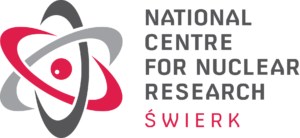National Centre for Nuclear Research
The National Centre for Nuclear Research (NCBJ) has been running a doctoral program in Physics already in the 1970s, under its former names: Instytut Badań Jądrowych and Instytut Problemów Jądrowych. NCBJ is the largest research Institute in Poland and has research category A in physics, category B+ in EEME (had common category A+ in the former evaluation) . It is also the only Polish institution operating a research nuclear reactor MARIA which celebrated its 50th anniversary in 2024. Currently NCBJ employs over 1100 people. The research staff includes 28 full (state) Professors, 52 holders of the “Dr hab.” post-doctoral degree (with professorial appointments), as well as over 200 PhDs. NCBJ has the right to confer Ph.D. degrees in Physics and Environmental Engineering, Mining and Energy as well as the post-doctoral “Dr hab.” degree in both of these disciplines.
Our Physics research teams pursue cutting-edge research in a number of areas of fundamental physics including nuclear and high-energy physics, neutrino physics, gravitational wave physics, astrophysics. International collaborations with which NCBJ research personnel are involved include T2K, Super-Kamiokande, KM3-net, JEMUSO, as well as the major CERN collaborations (LHCb, CMS, Alice, NA61-Shine). NCBJ is also an official research partner of the European Union’s Joint Research Center (JRC).
In the field of Environmental Engineering, Mining and Energy (EEME), our research team is composed mainly of the employees of the Division of Nuclear Energy and Environmental Studies (UZ3). They specialize in both deterministic (coupled neutronic and thermal-hydraulic) and probabilistic safety analyses, fuel cycle studies, reactor design, and new reactor technologies including Gen IV reactors as well as Small and Advanced Modular Reactors (SMR and AMR). They work with strong relation to the Polish industrial companies seeking help in nuclear power implementation. Experts from UZ3 successfully completed a number of safety and environment-related studies for companies planning to build nuclear power plants in Poland on a commercial basis. Among many past and current projects devoted to all aspects of nuclear power, currently the basic design of High-Temperature Gas-cooled Reactor HTGR-POLA financed by the Polish Ministry of Science and Higher Education (about 14.0 mln euro) has been finished and the new stage of detailed design is in preparation. The design is made in strong collaboration with the Japan Atomic Energy Agency (JAEA) on the footing of intergovernmental agreements. A Polish design company “Energoprojekt Katowice” is also involved as a subcontractor. International collaboration within the EEME field includes institutions such as V4G4 (Vyshehrad Generation IV Group) initiative which involves Polish, Czech, Slovak, and Hungarian partners, JAEA, University of Tokyo, King Fahd University of Petroleum and Minerals (Saudi Arabia), University of Illinois (USA), KTH Stockholm (Sweden) and many others. Also, dozens of projects have been and are being held including HTR-PL, Gospostrateg-HTR, Gemini+, Gemini 4.0, Allegro, SafeG, Eurofusion, DONES, WPENS, NARSIS, ESReDA, EuroCC and many others. NCBJ/UZ3 also possesses authorization from the PAA President (Polish regulator) in nuclear physics issues in practical applications for nuclear power plants, assessment of radiological effects resulting from safety analyses conducted for various states of nuclear power plants, and probabilistic safety analyses of nuclear power plants at levels 1 and 2. Last but not least, in the years 2018-2023 the Division UZ3 performed the project of the Ph.D. studies entitled “New reactor technologies for the Polish nuclear energy program” (www.phd4gen.pl) which, in fact, led to the start of the regular studies in EEME.
NCBJ is currently hosting multiple projects funded under Horizon 2020, National Science Centre (NCN), The National Centre for Research and Development (NCBiR), NAWA funds and from other (Ministry of Science and Higher Education; INTERREG BALTIC SEA Programme). The most significant recent projects are NOMATEN and CERAD. The Nomaten Centre of Excellence is a new research organisation where international world-class research teams design, develop and assess innovative multifunctional materials – materials combining advanced structural and functional properties – for industrial and medical applications. The funding (in total about 15.0 mln euro) comes from the European Union Horizon 2020 research and innovation programme. CERAD – the Centre for Design and Synthesis of Molecularly Targeted Radiopharmaceuticals – is a strategic research infrastructure listed on the Polish Research Infrastructure Roadmap, to be utilized both commercially and scientifically. The project will be run by a consortium established by NCBJ, Warsaw University, Institute of Nuclear Chemistry and Technology in Warsaw, Warsaw Medical University, Collegium Medicum of the Jagiellonian University in Cracow, and Medical University in Białystok. Activities of the consortium will be coordinated by NCBJ. NCBJ was recently awarded a NAWA project as part of the NAWA “Welcome to Poland” call.
